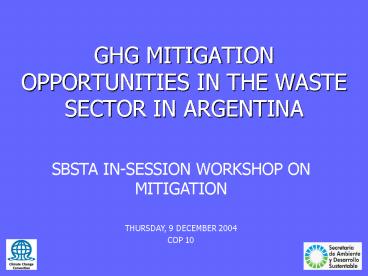GHG MITIGATION OPPORTUNITIES IN THE WASTE SECTOR IN ARGENTINA - PowerPoint PPT Presentation
1 / 17
Title:
GHG MITIGATION OPPORTUNITIES IN THE WASTE SECTOR IN ARGENTINA
Description:
ghg mitigation opportunities in the waste sector in argentina sbsta in-session workshop on mitigation thursday, 9 december 2004 cop 10 contents household waste ... – PowerPoint PPT presentation
Number of Views:58
Avg rating:3.0/5.0
Title: GHG MITIGATION OPPORTUNITIES IN THE WASTE SECTOR IN ARGENTINA
1
GHG MITIGATION OPPORTUNITIES IN THE WASTE SECTOR
IN ARGENTINA
SBSTA IN-SESSION WORKSHOP ON MITIGATION THURSDAY,
9 DECEMBER 2004 COP 10
2
CONTENTS
- HOUSEHOLD WASTE MANAGEMENT IN ARGENTINA
- NATIONAL STRATEGY
- BARRIERS TO PROJECT ACTIVITIES
3
GDP AND WASTE
4
-18
30,9
5
-27
32,6
6
SOCIOECONOMIC INDICATORS
- In October 2002 45,7 of the households were
below the poverty line - Unemployment peaked at 21,5 in May 2002
7
WASTE AND WASTE MANAGEMENT
- There exists the technological and economic
potential to hold GHG emissions. - Greater energy efficiency opportunities are
available, often at lower cost than expected.
8
HOUSEHOLD WASTE DISPOSAL IN ARGENTINA
- The dominant methods of waste disposal in
Argentina are landfills and open dumps. - There are
- 15 large landfills in the major metropolitan
areas. - About a 100 open dumps in the Buenos Aires
metropolitan area. - Around 2000 open dumps in urban areas.
- Approximately 65 of the urban population have
their waste disposed in landfills.
9
METHANE FROM LANDFILLS
- Current emissions of methane from disposed
household waste add to 14 million tonnes of
CO2e/per year (1997 national inventory). - Those emissions are equivalent to 5 of GHG total
emissions.
10
HOUSEHOLD WASTE DISPOSAL IN ARGENTINA
- Municipal waste management is limited to
- Household waste collection.
- Disposal in landfills
- Disposal in open dumps
- There are few technical controls
- Health and environmental risks.
11
HOUSEHOLD WASTE MANAGEMENT NATIONAL STRATEGY
- Diagnosis
- Poor institutional organization
- Scarcity of statistics and planning
- Lack of trained staff
- Insufficient legislation related to solid waste
management - Wide-spread waste collection
- Scavenging
- Significant amount of open dumps
12
HOUSEHOLD WASTE MANAGEMENT NATIONAL STRATEGY
- Technical Components
- Sorting at the household level
- Recycling and reuse
- Composting
- Energy recovery
- Closure of open dumps
- Methane recovery and use
13
HOUSEHOLD WASTE MANAGEMENT NATIONAL STRATEGY
- Other Components
- Revision and consolidation of the regulatory
framework - Public awareness
- Economic instruments
- Provincial Plans
14
BARRIERS TO METHANE RECOVERY PROJECTS
- Institutional barriers
- Solid waste and landfill management a low budget
priority for cities, due to heavy financial
constraints - Collection costs absorb almost 85 of waste
management resources - Lack of funds to finance new investments
- Regulatory issues
15
BARRIERS TO METHANE RECOVERY PROJECTS
- Technological barriers
- Managerial constraints at municipal level
- Landfills often distant from potential methane
clients - Landfills of medium/small cities may not generate
enough methane to reach commercial scale
16
BARRIERS TO METHANE RECOVERY PROJECTS
- Economic and financial barriers
- Electricity and natural gas price
- Scale of projects may not attract investors
- Lack or insufficient financing
- Lack of financial institutions understanding of
these type of projects.
17
How to overcome barriers?
- Technological barriers could be managed through
technical systems. - Clear and stable conditions are necessary due to
the long recovery period.































